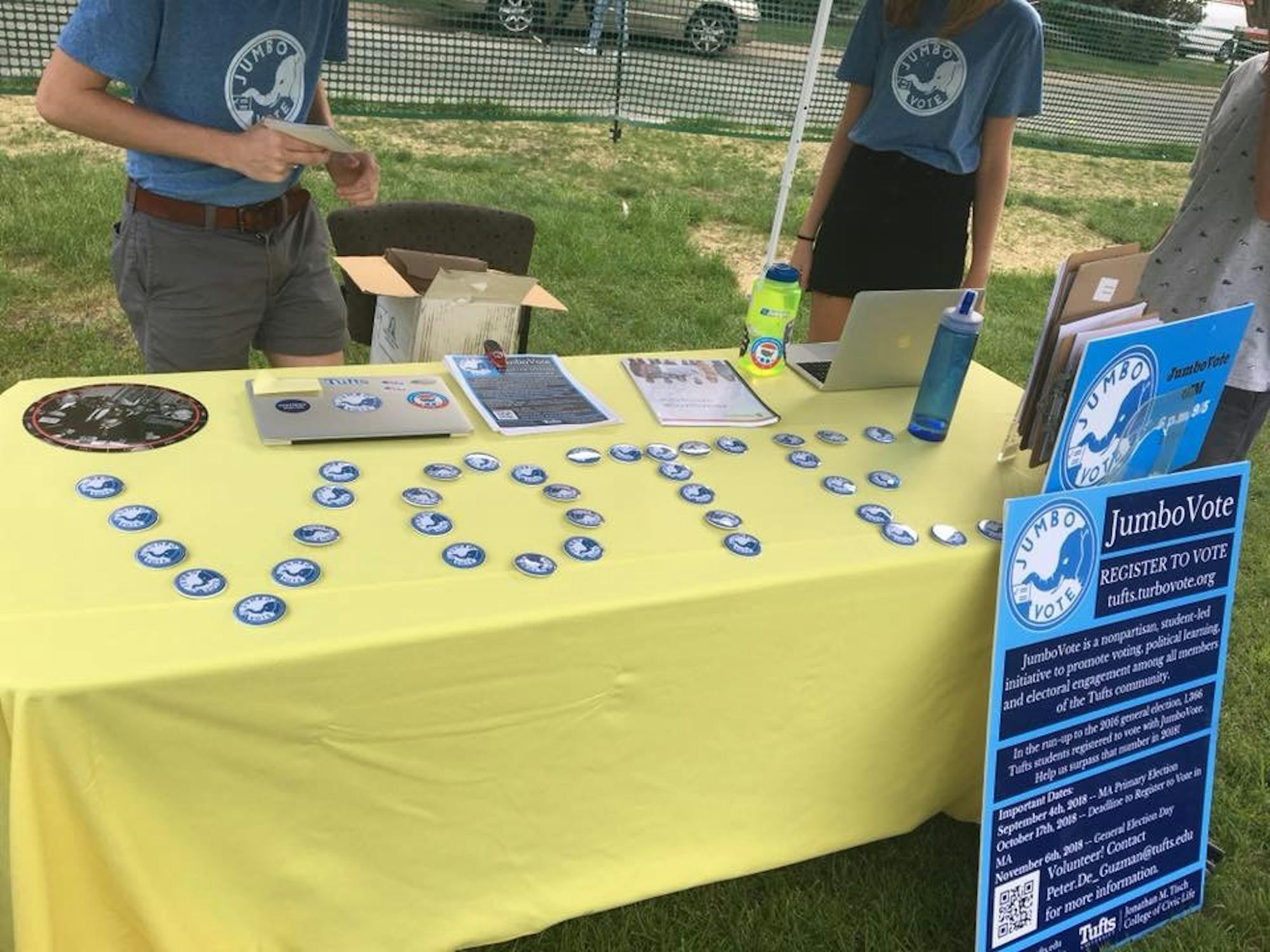Throughout American history, various movements and people have worked to expand access to the right to vote. The American Revolution was fought over representation, Susan B. Anthony fought to give women the right to vote and the 20th century ushered in the civil rights movement.
JumboVote, a nonpartisan, student-led initiative that started in the run-up to the 2016 election, aims to increase voting on all of the Tufts campuses, according to Jennifer McAndrew, the director of communications, strategy and planning at the Jonathan M. Tisch College of Civic Life. McAndrew said that the impetus for JumboVote came from research done by Tisch College's Institute for Democracy and Higher Education (IDHE).
“The [IDHE] runs the largest study of college student voting in America. They have 1,100 colleges and 10 million college students enrolled in the study, including Tufts," McAndrew said. "They produce a report for each university that is in the study after every federal election of the number and percent of students who are registered and vote. They do that by marrying up de-identified enrollment records with college voter rolls in all 50 states.”
McAndrew explained that the research proved that the voting rate among Tufts students was "very much average compared to the whole study overall."
“Tufts is a participant in the study and also decided to make the report public so that the community could know. After 2014, when the 2012 and 2014 election data came out, Tufts was very much middle of the pack [with] around 50 percent [voter turnout] in 2012 and 20 percent in [the] 2014 [midterm elections]," McAndrew said.
McAndrew said that former Provost and Senior Vice President David Harris suggested implementing a practice with Tisch College's resources to improve Tufts' voting turnout, and thus JumboVote started.
According to the National Study of Learning, Voting, and Engagement (NSLVE), Tufts students increased their voting participation by 12 percentage points, from 51.2 percent in the 2012 presidential election to 63.2 percent in the 2016 presidential election. Nationally, that increase was only 3.2 percentage points, from 45.1 percent in 2012 to 48.3 percent in 2016.
Peter de Guzman (LA '18), Tisch College student outreach coordinator, said that Tufts compares very well to its peers in terms of voter registration.
“One thing that’s cool is that when TurboVote published their new leaderboards in 2018, Tufts was number three in the nation. So it was Michigan, Harvard, Tufts, MIT and University of Maryland, College Park. If you go by percentage of undergraduates, we’re number two,” de Guzman said.
De Guzman, explaining JumboVote's goal and how it works, said that JumboVote is led by students and works in conjunction with Tisch College's student outreach coordinator, whom Tisch College hires among graduating seniors every year.
“Giving people those resources [to vote] is our real goal. We have a partnership with TurboVote, which is under the non-profit Democracy Works, so if you see students registering people on laptops with absentee ballots, that’s what that is. Since it's in its third year, JumboVote is growing into something that you can’t just operate within episodic elections. You need to tell people and train people and have teach-ins and educational opportunities every week," de Guzman said.
Sophomore Matthew Tolbert, the co-chair of JumboVote, is part of that day-in, day-out effort.
“We’re doing something just about every day. We have absentee voter office hours at the Women’s Center and we’re going to plan some at the Rainbow House and the Africana Center. We just try to make ourselves available to assist people with the registration process and the absentee voting process,” Tolbert said.
This is all part of JumboVote's underlying philosophy of increasing voter turnout by decreasing barriers and increasing motivation, while remaining nonpartisan, according to McAndrew.
“We don’t think voting is a partisan issue. We believe that society benefits when everyone participates, and we will work with any group.” McAndrew added.
Tolbert also stressed that JumboVote is a nonpartisan effort.
“We’re just registering people to vote. We never tell people how they should vote strategically. It’s completely up to you for who you want to vote for,” Tolbert said.
Tobert and de Guzman both said that they hope to expand reach of JumboVote beyond political groups on campus.
“In the past JumboVote has been made up of all the different civic organizations. So there would be representatives from Tufts Republicans, Tufts Democrats, Tufts Progressive Alliance, CIVIC and ... [other] groups, but this year we really wanted to be more overarching,” Tolbert said.
De Guzman said that JumboVote has been working with Chris Swan, the dean of undergraduate education in the School of Engineering, to reach engineering students.
“We’ve had a lot of success ... working with Chris Swan," de Guzman said. "So far, we’ve presented in five of the 10 intro to engineering classes and are confirmed for seven of the 10, and hopefully can end up with 10 of the 10.”
JumboVote also plans to increase motivation by getting students excited about voting and showing that voting is relevant to all students, according to de Guzman.
“[The School of Engineering] is doing a pilot program this year to incorporate civic engagement and civic education aspects to all of the intro to engineering classes," de Guzman said. "It is really cool, because one thing that I think of is that nothing you do, no matter what field you study, is nonpolitical.”






